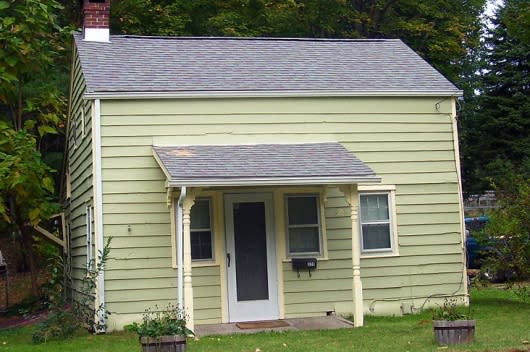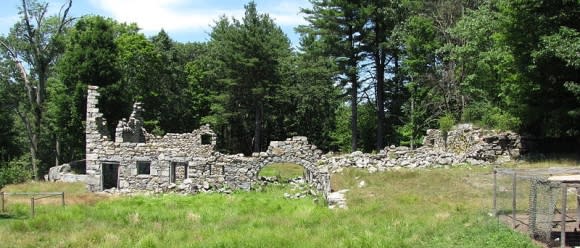Working As Intended: Lessons from the history of MMO housing
Once upon a time, a subscription MMORPG sandbox had open-world housing, only there wasn't quite enough for everyone. Well, there was, but there wasn't enough of it in safe lands, so a lot of the people who wanted a place to live had to live in dangerous places they didn't like, places where they could be killed on their doorstep by other players. Even most of the plots in the safe lands were so remote or allowed for such small homes that they were undesirable. In fact, there were only a few housing plots on every server that afforded a strategic advantage in PvP or trade or storage, and if you didn't own one of those, you were at a distinct disadvantage. And when new lands opened up, scripters and gold farmers were first in line to grab the best plots and sell them on Ebay for hundreds (sometimes thousands!) of dollars. And legit players were pissed.
I speak, of course, not of ArcheAge but of Ultima Online.
Ultima Online is old -- very old. In fact, it turns 17 next week. That's 17 years of making mistakes and learning from them and making more, 17 years of mistakes that other sandbox developers should be absorbing and dodging altogether, not repeating heedlessly. UO's tangled history is a free education in MMO game design.
ArcheAge slept through the lecture, unfortunately, along with the rest of its classmates. In the news recently, in addition to ArcheAge's launch, are housing blunders made in both WildStar and Final Fantasy XIV. The apparently troubled WildStar was "surprised" when the excellent housing system it hyped trumped its retrograde raid-and-gear grind with actual launch players. Final Fantasy XIV just launched yet another of its instanced-housing patches with homes that are inaccessibly expensive for most players after previously launching an instanced-guild-housing patch that did exactly the same thing and received exactly the same reaction. The "World of Warcraft version of housing" -- Blizzard's words, not mine -- has so far been a scaled-back disappointment in beta, delivering little of the customizability MMO players expect from their custom spaces.
Isn't it a sad day when we're still looking backward to Star Wars Galaxies, Ultima Online, EverQuest II, and much-maligned "WoW-clones" like RIFT for the best housing in the genre? How do developers keep screwing this stuff up? Is it actual ignorance of the industry's history? Or is it, as Massively's Eliot argued last week, a misguided arrogance, a belief that this time will be different because it's me?
I don't care why. Let's study the lessons now. It's too late for ArcheAge to start again, but it's not too late for the next sandbox.
Lesson #1: Do not launch a land rush, especially a pay-to-win land rush.
If you are not aware that most MMO launches are trainwrecks of one form or another, you have no business making an MMO. MMO launches are trainwrecks. There is lag. There are disconnects. There are server instabilities. There are e-thugs launching DDoS attacks for shits and giggles. You will have queues, overloaded servers, underpopulated servers, and newbie zones that look like mosh pits. Sometimes head start periods stagger these problems. Sometimes they drag them out longer. Millions of people will be stampeding your gates, no matter when you open them, and everyone will hate you even before anyone sees the actual game.
Combine such launches with desirable open-world housing and all hell breaks loose as players rush the game in a desperate attempt to grab land, which actually cripples your stressed server infrastructure even more. If you have created insufficient land for the number of players playing or have privileged some land over other land in some way, you will have a very cranky cadre of players who started out loyal to you and your game but who are now ticked because your server problems caused them to lose out on the race. You will also incentivize the botting and scripting and RMT that still happens to this day in UO when it comes to valuable land plots, especially if you decide against a hard cap on how much of your game's land an individual player can hoard.
Furthermore, if you charge players an exorbitant entry fee for getting to start the race early, which is what ArcheAge did with its head start early access packs that ran from $50 to $150, then you have not only created an artificial land rush but cynically profited from it, which is a bad way to kick off a sandbox's launch and engender trust. Worse, you have flirted with the implication that those who pony up will get what they believe they are paying for, and when those assumptions prove untrue -- and you knew they would because you knew how much "good" land you had vs. how many players were preordering -- your community will feel betrayed and rage, even if no promises were ever made, even if some pockets of land actually are still sparsely available, and even if more land becomes available later after the initial launch insanity subsides and the lookie loos depart.
A better solution would be to avoid the race. If you can, create more open-world housing space than your playerbase will ever use up, a la SWG. If that's impossible, then eliminate or diffuse the race. UO hasn't fully solved this problem; every expansion that adds new land still creates a land rush. But it did wise up with housing lotteries for its last batch of open land. If you see no way around a land rush, at the very least, delay the land rush until significantly after your launch problems are sorted out, or better yet, stagger and obscure the opening of different claimable territories so that no one knows when or where the race actually begins, so no one is advantaged by throwing money at developers or getting a jump on a long queue, and so actual in-game exploration is what is being rewarded.
Lesson #2: Housing should be a Goldilocks gold sink.
A housing system is an incredibly smart gold sink for your MMO economy, and your MMO economy is something you should care about if you're building a sandbox with awesome housing. You can drain inflated currency from the wealthiest landholders through housing maintenance and taxes and ensure that your players aren't in the habit of claiming land for the claim's sake.
But don't get carried away. The reason designers should include housing, especially open-world housing, is to establish believability in an immersive virtual world and instill a sense of permanence and ownership in your players, thereby making the game sticky enough that they can't bring themselves to leave. Housing, therefore, must be constructed as more than a gold sink to patch up your economic bungling or pad your cash shop or teach budget management to gamers. In other words, FFXIV, do not make your housing system a bottomless money sink that many of your subscribers can never hope to afford. It will not make your game sticky, and it will drain too little currency from the economy, failing in both purposes and annoying everyone.
Instead, your housing gold sink needs to emulate Goldilocks: It needs to be "just right." Find the happy medium between charging so little that ownership is trivialized and charging so much that ownership is a burden. Or consider EverQuest II's tiered system, which provides cheap housing for lowbies and expensive, extravagant housing for the wealthy, with a scaling tax rather than a flat tax that doesn't unduly penalize newbs. True, EverQuest II's housing is instanced, but instanced housing is better than nothing, especially when it is relevant to gameplay in some way (WildStar) or outrageously customizable (RIFT); bonus points when it's both (Landmark). Instanced housing is worse than nothing when it becomes just another facet of a static, tedious, colorless grind, Draenor.
Lesson #3: Harsh decay and land caps are unpleasant but absolutely mandatory for open world housing.
I am forever impressed that SOE shut down SWG's housing and city maintenance when Hurricane Katrina ravaged the Atlantic in 2005. It was a considerate move to prevent players from losing their in-game possessions. But SOE's reluctance to turn it back on for months and various other bad sandbox decisions (runaway inflation, extra character slots, dropped loot, maintenance draining from inactive accounts' banks) meant that when maintenance returned, it was virtually meaningless. A single person could keep the lights on for hundreds of structures and multiple cities across a few inactive accounts, and so that's exactly what happened. While there was always housing space available, there were rarely city plots open on the core servers, and outside of a handful of demolition events, houses and cities just sat in the game, taking up space and slowly draining a few meager credits from thousands of characters whose players had long since stopped paying for the game. It was one of the fundamental problems with SWG right up until the day the game sunsetted.
UO is saddled with this problem too, I should point out; a single $13 one-month sub will keep your house up for four months, though you can own but one house (more or less) per account.
ArcheAge, having also this open-world housing scheme, clearly foresaw this problem. Originally designed as a subscription MMO, it scrambled to convert to F2P prior to its Western launch and cleverly locked the ability to pay property taxes behind the optional subscription, thus ensuring that freebie accounts can't own land. This is good though not perfect, at least until someone comes up with a better way. ArcheAge has destructible buildings in PvP areas, as well. But ArcheAge still lacks hard caps on land ownership, and each server seemingly has fewer land tracts than players to contest them, even in safe areas, especially as server capacities are raised to reduce queue frustration. While taxes scale ever upward as you hoard more land, those taxes are only as powerful as the inflation rate is low. In a year, ArcheAge's countryside will look like UO's and SWG's in spite of decay and destruction mechanics unless the inevitable currency inflation is severely checked. Given the state of other MMO economies, I have little faith in that.
The solution to these problems is to limit how much land accounts can claim and force into decay those buildings whose owners do not pay to keep them up. Provide a short grace period (Landmark) but not a long and easily exploitable one. Bundle interior belongings or layouts into escrow to encourage players to return without allowing them to take up physical world space (Lord of the Rings Online, SWG). Ensure that land is distributed among paying, playing players. Balance your server populations carefully and never add more servers than you'll need after the three-month slump because if you think server merges spell doom for themeparks, know that they're even worse for open-world housing sandboxes (Vanguard, SWG), only slightly worse an option than ignoring the problem and expecting your players to pay to move themselves and lose their land in the process (UO, LotRO).

"Making player housing work the way fans expect is too hard to implement in a MMO," ZeniMax famously said about Elder Scrolls Online, the MMORPG heir to one of the greatest RPG series in history, the last four installments of which included housing with their launches. Bullpucky! MMOs new, old, and damn old have somehow managed to implement housing that makes players happy, some of them spectacularly well, some of them not so well, but all of them with a lesson to learn from. It's hard, but it's not "too hard," obviously, and the fans aren't asking for all that much. At least the games that are screwing up housing and failing to learn from mistakes have tried and produced something, blunders and all, including ArcheAge.
And for that, I salute it. ArcheAge is an impressive AAA semi-modern sandbox with few rivals for its staggering breadth of features and systems. It, and other games like it, just haven't taken significant steps to solve the core sandbox problems that keep the subgenre from flourishing beyond antique MMOs from a decade or more ago. Open-world housing is one of them.

The MMORPG genre might be "working as intended," but that doesn't mean it can't be so much more. Join Massively Editor-in-Chief Bree Royce on random Fridays in her Working As Intended column for editorials about and meanderings through MMO design, ancient history, and wishful thinking. Armchair not included.





